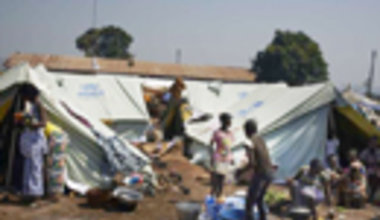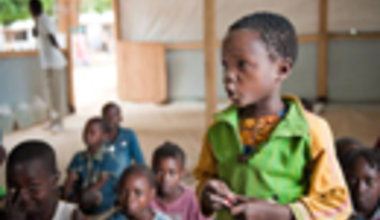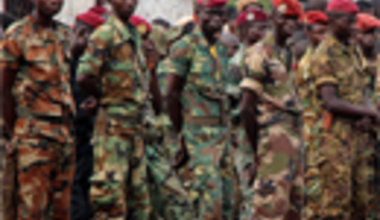Famine and malnutrition stalk strife-torn Central African Republic, UN agencies warn
31 December 2013 – United Nations agencies today warned of possible famine and severe malnutrition in the Central African Republic (CAR), calling on donors to provide urgent funding to mitigate the crisis in the impoverished country where a year of conflict has already killed thousands of people and driven 750,000 others from their homes.
“We urgently need support from donors so we won’t start running out of food in January,” the UN World Food Programme (WFP) Regional Director for West Africa, Denise Brown, said in Bangui, the capital of CAR. “We are providing food for hungry people wherever we can in CAR. But insecurity is the biggest challenge.”
With the coming harvest threatened since farmers have fled their lands or lack seeds due to looting and because people have had to eat them instead of saving them for planting, the UN Food and Agriculture Organization (FAO) and WFP have launched a 100-day response plan to boost nutrition and restore agricultural production through seed distribution and storage facilities.
But so far FAO has only been able to raise $4.3 million of the $61 million needed to help 1.8 million people, out of a total population of 4.6 million.
“The success of the next planting season crucially hinges on the return of farming families to the fields,” FAO said in a news release. “Families who are unable to plant in March will have to wait one whole year before they can hope to harvest again. Failure to help these families will have dramatic consequences on the food security for a quarter of the Central African population.
“The low production perceived from the last harvest coupled with a prevailing situation of chronic country-wide malnutrition is setting the stage for a full-scale food and nutrition security crisis should the next planting season fail.”
CAR has been thrown into turmoil since mainly Muslim Séléka rebels launched attacks a year ago and forced President François Bozizé to flee in March. A transitional government has since been entrusted with restoring peace and paving the way for democratic elections, but armed clashes have erupted again and the mainly Christian anti-Balaka movement has taken up arms.
Earlier this month Christians and Muslims launched reprisal attacks against each other in and around Bangui, where some 210,000 people were driven from their homes.
"The combination of food shortages and poor sanitary conditions in the camps and deep in the bush, as well as extreme poverty, risk triggering serious malnutrition,” FAO Country Representative Alexis Bonte said following a visit to Bossangoa, 160 miles north of Bangui, on Sunday.
WFP, which has appealed for $107 million through August 2014 to assist 1.25 million people, has called on all parties to ensure the safe and unhindered access of humanitarian personnel and the timely delivery of aid to people in need wherever they are. “WFP is neutral and delivers assistance solely on the basis of need,” Ms. Brown said.
Despite the volatile security situation, WFP and its partners have assisted more than 237,000 people since 5 December, and from January to April will increase food distributions, provide supplementary feeding to combat malnutrition among children under five, and aid vulnerable groups. From May to August, it will also reach more people in need during the lean season when the last harvest runs out.
The new emergency operation specifies that because of security risks, food distributions will be undertaken by teams moving swiftly from site to site and able to adjust plans. To avoid putting people in need of assistance at risk, a protection analysis will be conducted in each place. In some locations, cooked meals may be provided to help protect women and children.
Earlier this month WFP launched a special operation to deploy more staff, set up local offices, obtain vital security and telecommunications equipment and support establishing cross-border humanitarian flights into CAR at a cost of $5.3 million through June.
Source: UN News Centre
 UN
UN





